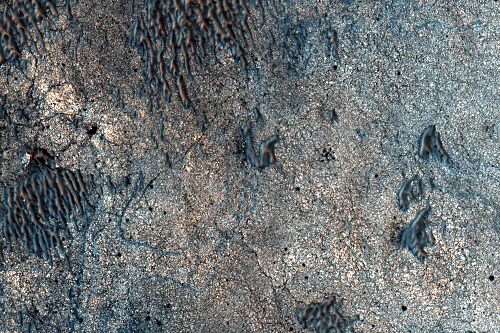Life on Mars? Why It Matters

News today from NASA that they've confirmed the presence of methane in the Martian atmosphere, concentrated in three areas (one of the major sources, Nili Fossae, is shown here). For a variety of reasons, this offers the strongest evidence yet that Mars may have an active biology under the surface.
While both geology and biology can produce methane on Earth, inorganic production of methane is generally associated with volcanic and tectonic activity, none of which has been witnessed on Mars (it's clear that Mars was once geologically active, but there's little or no evidence of current vulcanism). In addition, the three source areas each have very different geologies, further complicating the argument that the methane comes from geological activity. Finally, the "serpentinization" process on Earth tends to plug up sources of methane. NASA's Lisa Pratt, one of the scientists delivering the press conference today, argues that while this isn't positive proof that the methane comes from biological activity, it does make the geological argument harder to sustain and makes the biological argument "more plausible."
An additional bit of complexity is that the methane seems to be leaving the Martian atmosphere faster than the chemical composition of the Martian environment would suggest. A biological process -- where the methane was being consumed by microbial life -- would fit the evidence. Follow-up research, unfortunately not possible with the current satellites and robots working Mars now, should be able to find more definitive (positive or negative) evidence.
So what would we have if we determined that there were microbes making methane, and other microbes consuming methane? An ecosystem -- the first ecosystem found someplace other than Earth.
This would be amazingly important for a variety of reasons, not the least of which being that we'd finally have a chance to do comparative ecology.
Everything we know about how ecosystems work, how biology works, comes from a single data point: Earth. And while there's quite a bit of diversity within the Earth's ecology, it's all based on more-or-less the same basic biological stuff. What would Martian microbes have as the equivalent of DNA? Genes? Would there be elements of their biochemistry that would be unusually surprising?
Then there's the possibility that said Martian microbes would have a biology essentially identical to that found on Earth. The most plausible explanation for that would be that Earth life actually started on Mars (which cooled faster than Earth, so would have started its biology sooner) and was exported via Martian rocks ejected from massive impacts and hitting Earth as meteorites. We've discovered Mars-origin meteorites on Earth, so we know this is plausible.
So many questions. Hopefully, NASA will get the funding it needs to look for the answers.






Comments
Of course, this would need mucho dinero, but wouldn't it be easier to send a couple scientists to study this, instead of dozens of bots and satellites that haven't the same intelligence we do?
Posted by: Raevynne | January 15, 2009 4:46 PM
@Raevynne: You'd think so, but scientists require food, air, water and space. All things robots can do without. All things that have mass- which means you need more energy to push them up into space. Which means you need more fuel, since that's where the energy comes form. But the fuel also has mass. Which means you need more fuel to lift the extra fuel you're bringing along to lift the air, water, food, etc.
Also: when we send humans, there's an expectation that we'll bring them back (or provide the resources they need to live off the land indefinitely). Which means we need to carry enough fuel to not only get them there, but to get them back.
Also: humans are impatient. Probes are not. The cheapest route we can send a probe usually involves a few gravity slingshots; we may get to Mars my way of Venus. Annoying for humans that are traveling, but robots don't notice.
Posted by: t3knomanser | January 17, 2009 9:39 AM
Hi Jamais,
You might remember me from Futurehi.net from a few years back. I've really enjoyed reading your new blog here, and follow your thoughts on 'resilance' with keen interest.
Regarding your post, I'm excited as you are about the prospect of life on Mars. I see two very important possible outcomes to discovery:
1) Said mars biology has identical or near-identical molecular/dna markers to earth. In this case the two possibilities are that life originated at one location (most likely Mars), and via panspermia (asteroid collision), this life landed on Earth ans started again. Or that somehow the autocatalytic sets that Stuart Kaufmann talks about converge on a very similar biology regardless of origin. If this turns out to the be the case, how amazing it would be that there would be earth-like lifeforms scattered around the universe. However, I believe the panspermia explanation is far more likely.
-or-
2) Life on mars is distinctly different from Earth. This is the more exciting possibility, because the idea that in just one star system two UNIQUE origins of life occurred. If this turns out to be the case, the probability would be VERY HIGH that life is found on virtually any world where the conditions are right.
Given the exoplanetary research is finding planets as common by-products of stellar formation, could translate into tens, possibly hundreds of billions of potentially life-bearing planets in our galaxy. Of course this in turn gives us telling (although not necessarily hopeful) clues about intelligent life making it past it's technological adolescence.
Posted by: Paul Hughes | January 18, 2009 3:20 AM
at what point do, or more importantly *can*, we just give up on NASA, scrap it and start over..
maybe with the world's best and brightest?
Posted by: m1k3y | January 19, 2009 8:45 PM